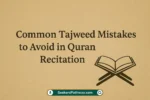Prophet Shu‘aib, may Allah be pleased with him, was one of the noble messengers of Allah sent to straighten out his people the people of Madyan (Midian). He is discussed at length in the Quran as a prophet who advocated for justice, economic integrity, and monotheism. His people, personally, got engaged in corruption, had committed fraud in trade and social injustice, which resulted in the end of them destruction. Prophet Shu’aib (AS) was known for his eloquence, patience, and firm belief in relaying the words of Allah no matter how ill-received.
His story is an important lesson on honesty in trade, social justice, and standing firm in faith, even when challenged by a corrupt society.
The importance of Shu‘aib’s (AS) mission and the fate of his people, as conveyed in the Quran, is as follows:
“And to Madyan we sent their brother Shu‘aib. He said, ‘O my people, worship Allah; you have no deity other than Him. And do not decrease from the measure and the scale. Indeed, I see you in prosperity, but indeed, I fear for you the punishment of an all-encompassing Day.”
(Surah Hud 11:84)
Birth and Lineage: The Noble Roots of Shu‘aib (AS)
It is stated that he was a descendant of Prophet Ibrahim (AS) through his son, Midian (Madyan). He was born amongst the Madyanites, who were a wealthy but corrupt people notorious for cheating in trade, dishonesty, and refusing divine guidance.
Although Shu‘aib (AS) was raised among a community of corrupt, dishonest people, Allah guided him to be honest; he grew up with a clear heart. His wisdom and eloquence revealed themselves at an early age, earning him the moniker of “The Orator of the Prophets” in Islamic tradition.
The People of Madyan: A Society of Corruption and Deception
Madyan was a prosperous city located on a major trade route in the area near the present-day Jordan, close to the land of Thamud. The Madyans indulged in polytheism and were involved in economic fraud because they remained in the worship of false gods. Their most grievous transgression, as emphasized in the Quran, was manipulating weights and measures, cheating customers, and accumulating riches through unlawful methods.
Allah describes their actions in the Quran:
“And do not deprive people of their due and do not commit abuse on the earth, spreading corruption.”
(Surah Ash-Shu‘ara 26:183)
Instead of using their wealth for good, they oppressed the poor and justified their deceitful practices, believing that their economic power made them untouchable.
It was in this atmosphere that Allah selected Shu‘aib (AS) to be a prophet to guide his people back to justice, honesty, and faith in the one true God.
Prophethood and the Call to Justice
When Prophet Shu‘aib (AS) received revelation, he fearlessly challenged the moral crisis around him. He spoke to them with wisdom and patience, encouraging them to:
- And worship Allah and do not associate with Allah anyone.
- Stop cheating in trading and pay people what they deserve.
- Stop oppression and corruption in society
His message was clear:
“O my people, worship Allah; you have no deity other than Him. And do not give short measure or weight. Indeed, I see you in prosperity, but indeed, I fear for you the punishment of an all-encompassing Day.”
(Surah Hud 11:84)
His people mocked him, each one unwilling to depart from his ways of deceit. They saw nothing wrong with what they did, and instead accused him of attempting to change their customs and had threatened their wealth.
They said:
“O Shu‘aib, does your prayer command us to we should leave what our fathers worship, or not do with our wealth what we please? Indeed, you are the forbearing, the discerning!”
(Surah Hud 11:87)
Their arrogance blinded them, as they believed their economic power made them immune to divine punishment.
The Rejection and Threats Against Shu‘aib (AS)
As Shu‘aib (AS) fulfilled his mission, the people became more and more antagonistic. They made fun of him, mocked his belief in God, and even threatened to expel him and his disciples if they did not revert to spiritual adultery.
“They said, ‘O Shu‘aib, we do not understand much of what you say, and indeed, we consider you weak among us. And if not for your family, we would have stoned you. And you are not dear to us.”
(Surah Hud 11:91)
Shu‘aib (AS) did not weaken in the face of their threats and warned them that Allah’s punishment was close. He mentioned to them the annihilation of the people of Lut (AS) and warned that they would perish just like them, and they must repent.
“And O my people, let not your dissension from me cause you to be struck by that which struck the people of Nuh or the people of Hud or the people of Salih. And the people of Lut are not far from you.”
(Surah Hud 11:89)
Yet, they mocked the warning, challenging Shu‘aib (AS) to bring the punishment upon them.

The Divine Punishment on Madyan
After years of hostility and rejection, finally, the punishment of Allah descended upon Madyan. Multiple verses in the Quran describe the destruction of Shu‘aib (AS) and his people through three different forms of divine wrath:
1. A Blazing Heatwave
Allah ordered a heat wave over Madyan. The population was trapped, reeling from a heat they could not withstand, seeking shelter and not finding it.
“And they were seized by the punishment of a cloudy day. Indeed, it was the punishment of a terrible day.”
(Surah Ash-Shu‘ara 26:189)
2. A Mighty Earthquake
In the middle of the scorching heat, a severe earthquake rocked Madyan, levelled their houses and marketplace.
“So the earthquake seized them, and they became within their home [corpses] fallen prone.”
(Surah Al-A‘raf 7:91)
3. A Devastating Cry (Sayhah)
This was followed, finally, by a mighty sound (Sayhah), a sound that destroyed everything, and Madyan totally destroyed.
“And the shriek seized those who had wronged, and they became within their homes [corpses] fallen prone.”
(Surah Hud 11:94)
So the wealth and influence could not shield them. They were erased from existence, erased from their world, erased from the memory of all things.
The Salvation of Shu‘aib (AS) and His Believers
Before the Azaab came down, Allah instructed Shu‘aib (AS) and his people to exit Madyan. When they were leaving, Shu‘aib (AS) turned back and lamented for his people, saying:
“O my people, I had certainly conveyed to you the messages of my Lord and advised you, so how could I grieve over a disbelieving people?”
(Surah Al-A‘raf 7:93)
The scriptures confirm that Shu‘aib and his followers emigrated and deserted the devastated lands of Madyan.
Final Years and Death of Prophet Shu‘aib (AS)
The Quran does not specify where Shu‘aib (AS) spent his later years or how he passed away. According to Islamic Traditions, he lived a long life and preached to people the message of Allah till his very end. Some think he was laid to rest in Jordan, where his gravesite has become a point of historical interest.
Lessons from the Life of Prophet Shu‘aib (AS)
- Business Honesty – Cheating and fraud will destroy things.
- Justice and Fairness – Oppression is not befitting of Allah.
- The Strength of Faith – When we stand strong in adversity, God comes to our aid.
- The Perishing of Pride – Neither wealth nor power can save from Allah’s Determination.
Conclusion
As a man of justice and truth, Prophet Shu‘aib (AS) gives a warning to humankind against corruption and dishonesty in trade. His patience in responding to rejection and undeterred commitment to Allah’s command is a shining example of faith. May peace be upon the Prophet Shu‘aib (AS) and all the prophets of Allah. Ameen.










